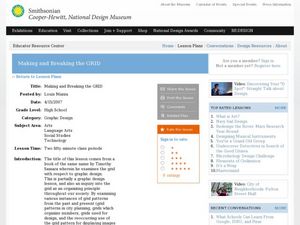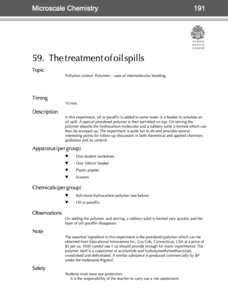Curated OER
Do You Hear What I Hear?
Students study hearing and are able to differentiate between different sound waves. For this sound wave lesson students develop a cause and effect model that shows the parts of the ear.
Curated OER
Life Science- Useful Waste
Fourth graders explore the topic of waste and recycling. In this useful waste lesson, 4th graders classify objects and sort them into most usable and least usable categories. Students complete an activity sheet and have a discussion on...
Curated OER
Sorting Buttons
Students study sorting. In this classification lesson, students sort buttons into groups based on a common characteristic and draw two pictures illustrating the different groups.
Curated OER
Animal Tracks
Students study animals. In this science instructional activity, students make plaster casts of animals that live in the area. Students identify the tracks.
Curated OER
Observation Hike
Students participate in an observational hike to study the natural surroundings. In this observational hike instructional activity, students hike through a state park and observe the plant and animal life. Students learn about...
Curated OER
General Lesson Plan for Documentary Lens
Use this general lesson guide to inform your instruction surrounding a documentary. The lesson is made up of five activities. The activities are intentionally general because they are designed to adapted for specific films. While the...
Edgate
Why Map a Map?
After brainstorming reasons why Native Americans mapped their lands, your young critical thinkers will work together to review their ideas and determine the definition of a map. With today's extensive use of mapping technology and GPS...
Core Knowledge Foundation
Christopher Columbus
Take some time to focus on Christopher Columbus, his three ships, the purpose of his voyage, and the new land he discovered. Pay special attention to the included additional materials, they are the real value in this resource.
Albert Shanker Institute
Economic Causes of the March on Washington
Money can't buy happiness, but it can put food on the table and pay the bills. The first of a five-lesson unit teaches pupils about the unemployment rate in 1963 and its relationship with the March on Washington. They learn how to create...
Southern Nevada Health District
Is It Fruit?
The concept is the most valuable feature of this resource, which is designed to bring learners' attention to the nutritional labels of food items. Your class will take a closer look at the labels on bottled juice containers to determine...
Curated OER
Effects of Water Pollution on Aquatic Organisms
Students investigate water pollution. They develop an understanding of the behavior of organisms, of the structure and properties of matter, and of natural and human induced hazards by conducting lab tests. They present their data...
Curated OER
Making and Breaking the Grid
Students examine the grid in terms of a method of organization in our society as well as graphic design. In this "Making and Breaking the Grid" lesson, students design solutions to common problems and draw conclusions about patterns and...
Curated OER
How do I start a blog?
Learners explore blogging. They research internet blog sites and read articles on blogging. Students discuss what makes a good blog. They study pros/cons to placing personal information in a public space.
Curated OER
Cystic Fibrosis
Students examine the disease Cystic fibrosis, the causes, and the effects it has on the respiratory system. Students use the Biology Workbench and tools on the National Center for Biotechnology Information website to study the protein...
BioEd Online
Bone Structure: Hollow vs. Solid
What is meant by the phrase "form follows function?" Allow your budding biologists to discover first-hand through two activities. In the first, groups work together to discover whether a solid cylinder or an empty cylinder can support...
Curated OER
African Savanna Habitat Diorama Craft
Set the stage for a unit or lesson on the African savanna by creating a cute habitat diorama. Cheetahs, lions, zebras, and elephants are all present in a shoe-box-sized craft that requires your learners to color, cut, and paste. These...
Lincoln-Sudbury Regional High School
WWII Position Paper
There are some historical events that may warrant greater reflection and more in-depth analysis, and the decision to intern Japanese-Americans in the United States during World War II, as well as to drop the atomic bomb on Hiroshima and...
Federal Reserve Bank
FRED in the Classroom: Employment and the Labor Force
Acquaint your class members with data sources for employment in the United States and help them gain a better understanding of a vital measure of our economy's health.
University of Minnesota
Welcome To Your Senses
Sound, sight, taste, touch, and smell—oh the world of senses! What do these five senses have to do with the brain? The answer: everything. Explore how the brain sends and receives messages by having the class participate in several sense...
Royal Society of Chemistry
The Treatment of Oil Spills—Microscale Chemistry
When oil spills happen, how is the oil cleaned up? Pupils of polymer science discover an amazing substance that turns oil into a solid during a microscale experiment. Individuals observe oil or paraffin before and after addition of the...
Colorado State University
What's the Difference Between Blue Light and Red Light?
Finally, an electromagnetic spectrum lab that will get glowing reviews from your class! Explore the nature of light using red and blue LED sources and fantastic phosphorescent paper. Young scientists compare the effects of blue light...
Mathematics Vision Project
Module 9: Modeling Data
How many different ways can you model data? Scholars learn several in the final module in a series of nine. Learners model data with dot plots, box plots, histograms, and scatter plots. They also analyze the data based on the data...
Discovery Education
Motion in the Ocean
How do temperature changes affect ocean currents? Scholars explore convection currents by demonstrating the flow of water in a baking dish. They use ice, heat, and food coloring to see currents. Then, they draw conclusions about their...
Curated OER
Coffee Cooling
Students explore the factors that affect how long coffee stays hot. They develop a question and a testable hypothesis for one factor such as initial temperature or size of opening of the container. Then they design and conduct an...
Other popular searches
- Scientific Inquiry Skills
- Science Inquiry Skills
- Inquiry Skills Five Senses
- Using Inquiry Skills
- Teaching Inquiry Skills
- Math and Inquiry Skills
- Basic Inquiry Skills
- Research and Inquiry Skills
- Name 5 Inquiry Skills
- Social Studies Inquiry Skills

























